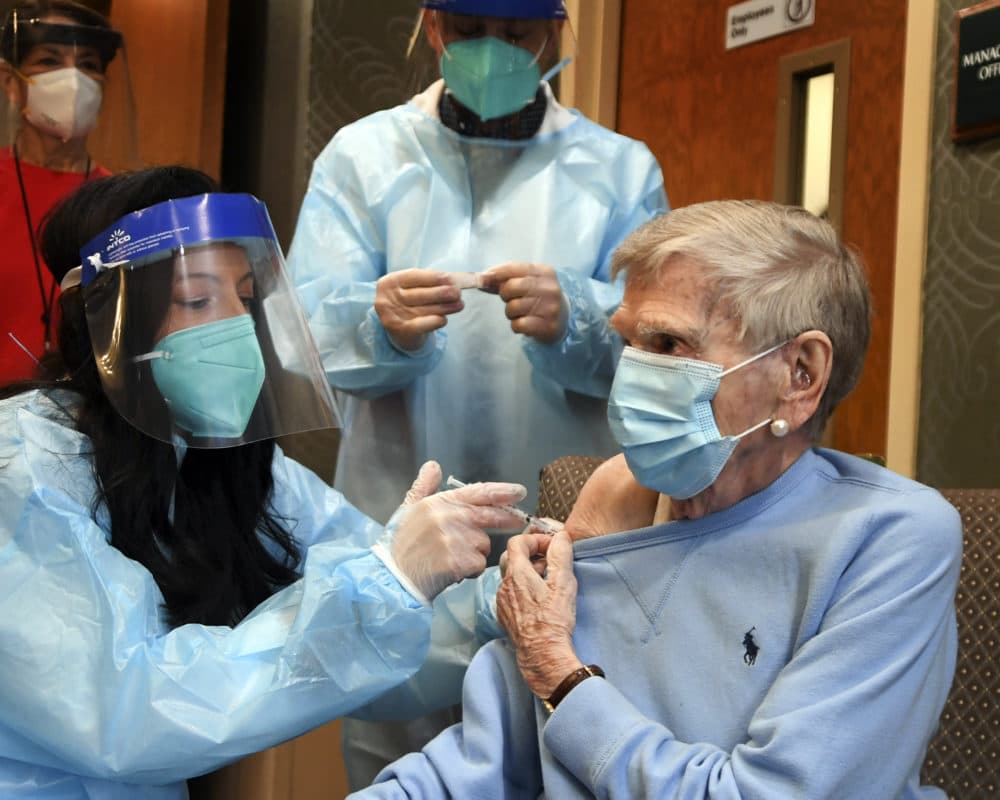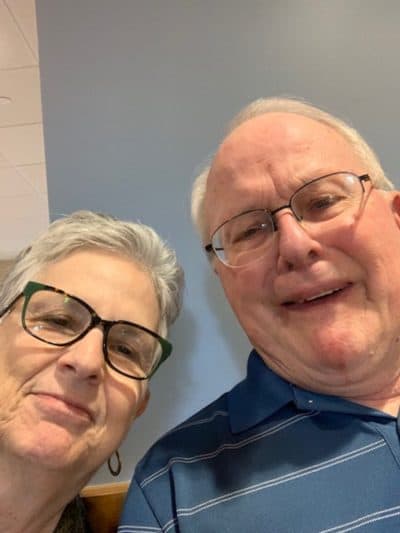Advertisement
Coronavirus Coverage
Mass. Long-Term Care Facilities Prepare For Coronavirus Vaccines After Months Of Isolation And Loss

Anticipation. That’s what retired biology teacher Janet Brady feels about the coronavirus vaccinations expected to begin at Massachusetts long-term care facilities next week. And she says many of her neighbors at the Orchard Cove assisted living residence in Canton feel the same.
"We’ve all been waiting for it — sort of breathlessly," she says.
For Brady, the vaccine will mean liberation from months of isolation. And she hopes it will let her spend much more and better time with her husband, Tom. He has dementia and no longer speaks, so touch is especially important.
"I just want to be able to hold my husband’s hand," she says. "That’s something that I need to be able to do. And I’m hoping the vaccine will allow that to happen."
If all goes well, the vaccine rollout will allow that to happen, and fairly soon: The plan is for tens of thousands of doses of Pfizer's vaccine to be given to staff and residents at Massachusetts long-term care facilities starting next Monday through the end of February.
We can’t just call up the vaccine supply store and say, ‘Hey, we would like a thousand doses.'
Dr. Helen Chen, chief medical officer, Hebrew Senior Life
The need for protection against the virus in long-term care is especially great. Statewide, roughly one in every seven nursing home residents died this year of COVID-19. And despite improved defenses, dozens of new cases are still reported every day.
The vaccines for those in long-term care will be administered by two giant pharmacy chains: CVS and Walgreens.
CVS expects to inoculate residents in about 2,000 facilities statewide, for a total of roughly 173,000 patients.
Worcester CVS pharmacy manager Vicki Saengkheune will be with one of the traveling teams that parachute in with the vaccines; she’s giving up her days off in the coming weeks to do that on top of her full-time pharmacy job.
"But I'm really happy to do it," she says. "I actually have two small kids at home, and usually my days off are hanging out with them. So I think they're going to understand why Mommy is out for the next few weeks."
Advertisement
Ensuring that everyone gets vaccinated -- I think that is going to be the biggest challenge.
CVS pharmacy manager Vicki Saengkheune
Saengkheune says a big part of the job now is to increase acceptance of the vaccines among residents and long-term care staff by informing people that they appear to be safe and provide protection against the virus. So she expects to be doing a lot of talking as well as injecting.
"Ensuring that everyone gets vaccinated — I think that is going to be the biggest challenge," she says.
The pharmacy vaccine teams plan to visit each facility three times. The vaccines involve just two doses, but it will take more than two visits because the whole staff can’t be vaccinated at once.
"So most of the nursing homes are trying to stagger," says Dr. Asif Merchant, who is chair of the Mass. Medical Society's committee on geriatrics, medical director of several Boston-area nursing homes and a member of the state’s vaccine advisory committee.
"You could face a perfect storm where a number of nursing home residents could be sick as a result of the side effects of the vaccine," he says, "and at the same time, there would be several staff call-outs, if you try to vaccinate a majority of the nursing home population."
The scheduling is a bit tricky, he says, though the good news is that older people seem to get fewer vaccine side effects like fever. "That response is somewhat blunted in the elderly," Merchant says.
The scramble to prepare for the vaccines also involves getting consent forms signed and logistics worked out. Dr. Helen Chen, chief medical officer at the nonprofit senior health care network Hebrew Senior Life, says the pharmacy teams’ job is mainly to give the shots.
"So they’re expecting the facilities to tee up everybody — have all the paperwork and scheduling and processes in place — so that they are just walking down the line injecting people," she says.

Or going to people’s rooms if they can’t come to a common area. Dr. Chen emphasizes that the government is in charge of vaccine supplies, "and I think people need to be patient and understand that a lot of the distribution of the vaccine, particularly for our organization, is not necessarily within our control," she says. "We can’t just call up the vaccine supply store and say, ‘Hey, we would like a thousand doses.' That is not going to happen, at least not in the near term. "
But everyone who wants a vaccine will get one eventually, Dr. Chen says, and everyone, vaccinated or not, will need to keep masking and distancing for quite a while.
At Hebrew Senior Life, one priority group for vaccines is memory care, she says, "because what we learned earlier in the spring is it’s really hard or impossible to have cognitively impaired people adhere to masking and social distancing and hygiene."
For Janet Brady, that means her husband, Tom, who is in a Hebrew Senior Life memory unit, could get the vaccine sooner rather than later. She already knows what she wants to do first in the post-vaccine era:
"To have a little bit of time with my husband," she says, "giving him some hugs and being able to rub his back, and kiss him on the cheek, and all those things."
This segment aired on December 22, 2020.
